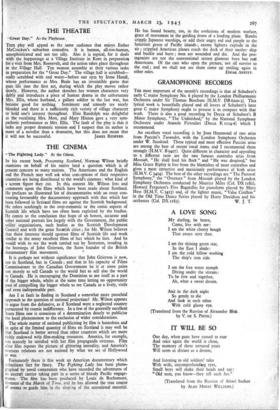"The Fighting Lady." At the Odeon.
THE CINEMA
IN his recent book, Presenting Scotland, Norman Wilson briefly examines on behalf of his native land a question which is of present concern to many nations. The Americans and the English and the French may well ask what conceptions of their respective countries are being distributed to the world's cinemas : what kind of a screen figure they cut. In this context Mr. Wilson lists and comments upon the films which have been made about Scotland. He prefaces an illustrated list of documentaries with an essay con- trasting favourably the documentary approach with that which has been followed in fictional films set against the Scottish background. He refers scathingly to the over-romantic or the comic aspects of Scottish life which have too often been exploited by the ttudios. He comes to the conclusion that hope of an honest, accurate and sober national portrait lies largely with the Government, the public utility organisations, such bodies as the Scottish Development Council and with the great Scottish cities ; for Mr. Wilson believes that these interests should sponsor films of Scottish life and work similar to the many excellent films of fact which he lists. And he would wish to see the work carried out by Scotsmen, treading in the footsteps of John Grierson, the Scots founder of the British documentary film movement.
It is perhaps not without significance that John Grierson is now, not in Scotland, but in Canada ; and that in his capacity of Films Commissioner to the Canadian Government he is at some pains not merely to sell Canada to the world but to sell also the world to Canada. He is encouraging the Dominion to see itself as a part of the bigger whole whilst at the same time letting no opportunity pass of compelling the bigger whole to see Canada as a lively, virile and even indispensable part.
Am I at fault in finding in Scotland a somewhat more parochial approach to the question of national projection? Mr. Wilson appears to argue from the defensive, as if Scotland were a neglected country persecuted by cosmic indifference. In a few of the generally excellent Scots films one is conscious of a determination dourly to publicise the local phenomenon to the exclusion of wider considerations.
The whole matter of national publicising by film is hazardous and in spite of the limited quantity of films on Scotland it may well be that Scotland is better served than other countries which are more richly endowed with film-making resources. America, for example, can scarcely be satisfied with her film propaganda overseas. Film after film repeats the picture of glittering unreality, and America's overseas relations are not assisted by what we see of Hollywood St war.
Fortunately there is this week an American documentary which substitutes fact for fancy. The Fighting Lady has been photo- graphed by naval cameramen who have recorded the adventures of an aircraft carrier taking part in a series of bloody Pacific engage- ments. The film has been produced by Louis de Rochemont, inventor of the March of Time, and he has allowed the true course of events to guide him in the shaping of the sensational material.
He has found beauty, too, in the evolutions of modern warfare, grace of movement in the guiding down of a landing plane. Bombs cripple Japanese warships, or add their angry red and purple to the luxuriant green of Pacific islands • enemy fighters explode in the '
air crippled American planes reach the deck of their mother ship and buckle and burn ; men are wounded and die. And the pro-. tagonists are not the conventional screen glamour boys but real Americans. Of the cast who open the picture, not all survive to the end ; and we shall not see them come up smiling again in


























 Previous page
Previous page